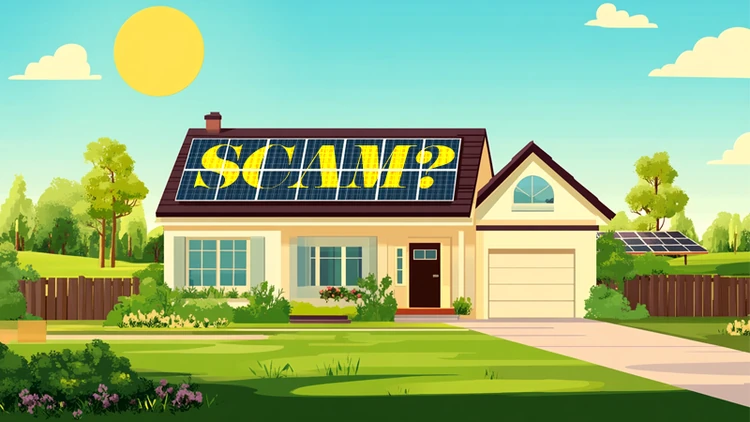Dont rush into anything the sun will come out tomorrow, you know!

What does every good idea seem to attract? A scam!
With solar panel pricesdropping due to increased production and technological advances and their efficiency improving, scammers are going door to door promising sorts of goodies:free rooftop solar panels at no cost to consumers and telling people that theyll never have to pay another electricity bill because government programs, grants, or rebates cover their solar installation. Every single one is a scam.
And complaints about those scams are clogging the Federal Trade Commission's (FTC) mailbox. Solar-related complaints are up nearly 750%since 2018.
Financing and technical gibberish top the list
The financingaspect is important because that is whata lot of the complaints are about. Again, there arethose "free" angles.
ConsumerAffairs' Kathryn Parkman suggests that the only "free" thing thatsolar panelsgenerate is free electricity.
"But installing a solar energy system still costs money," she said. "A typical 8-kilowatt (kW) solar panel system costs $18,750 to $28,310 before factoring in the 30% federal solar tax credit."
And, yes, it's true that there are somegovernment-funded solar programs, credits, andincentives for households that qualify, but, again, don't buyinto anything that comes out of a salesperson's mouth resembling the word"free." Honest businesseswill tell you exactly how much itll costto get and install solar panels.
But, even though a solar panel company may sound credible and never utter "free," you can't stop there. Understand the terms of any financing options and ensure they are transparent and favorable.
And whatever you do, avoid high-interest loans or long-term leases. Both of those could be riddled with hidden fees.
Larissa Bungo, senior attorney with the Federal Trade Commission, warns consumers that another thing a scammer will ask for is an advance fee.
In general,reputable solar companies typically require a small deposit to secure your spot on their installation schedule, but this deposit should be a reasonable percentage of the total cost, often around 10-20%. Some companies may even offer no-money-down options.
"To get you to pay, scammers promise you big savings if you act fast but theyll vanish with no intention of ever doing or finishing the work," Bungo says."Legitimate providers will work with you to figure out whether solar energy is right for you."
Solar panel scammers also prey on consumers who lack a thorough understanding of how solar panels work or are made, using various deceptive tactics to exploit their ignorance. In this video, Jack the Solar Guy breaks down the financing tricks and explains how scammers will use jargon to their advantage.
Slow your roll
And, whatever you do, take your time. As Annie claimed on Broadway, the sun will come out tomorrow, you know.
If someone is rushing you to sign a contract, or insists you sign an agreement on an electronic tablet without showing you the full agreement, stop. Thats something scammers do, Bungo said.
Take the time to read and understand the agreement with the provider. Pay attention to warranties, cancellation policies, payment schedules, and try to spot any hidden fees. Honest businesses will give you time to go over the terms of the contract, understand the agreement, and let you sign it in writing.
If youre looking at solar energy for your home, get quotes from reputable providers with a valid license. Then compare them, Bungo suggests.
Before signing any contracts, confirm that the solar installer is licensed and insured. And be sure to check out reviews, too.
To get started, you can check out ConsumerAffairs solar energy guideand reviews; the National Consumer Law Centers guide;or the Department of Energys guide for homeowners and commonly asked questions to learn more.
Photo Credit: Consumer Affairs News Department Images
Posted: 2024-09-27 13:11:13




















